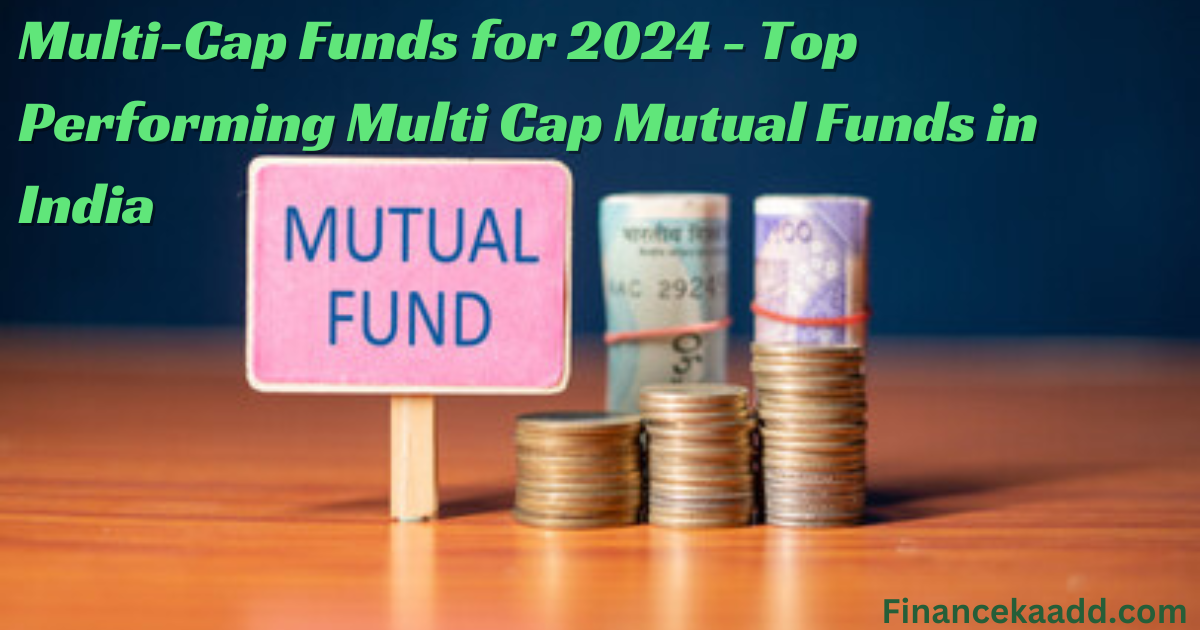Multi-cap funds are like assembling a diversified portfolio of financial superheroes. Each fund category has its own unique strengths, and multi-cap funds are versatile all-rounders. In this article, we’ll explore the top-performing multi-cap mutual funds in India for 2024. Buckle up, fellow investors, as we embark on this financial adventure.
What are multi-cap funds?
Multi-capital funds are like chameleons—they adapt to market conditions effortlessly. These funds invest across market capitalizations, including large-cap, mid-cap, and small-cap stocks. The beauty lies in their flexibility: when large caps dominate, they tilt that way; when mid and small caps shine, they follow suit.
Why Multi-Cap Funds?
Diversification: Multi-capital funds spread their wings across sectors and market segments. This diversification minimizes risk and maximizes returns.
Dynamic Allocation: Fund managers adjust the portfolio based on market trends. They’re like chess grandmasters, making strategic moves to capture gains.
Growth Potential: By investing in companies of all sizes, multi-capital funds tap into growth opportunities wherever they bloom.
BEST BOOK MUTUAL FUNDS👉BUY NOW
Top Picks for 2024
1. XYZ Multi-Cap Fund
The aim is to achieve lasting growth in capital value through investments in a varied portfolio.
Performance: XYZ has consistently outperformed its peers over the past five years.
Key Holdings: blue-chip giants, promising mid-caps, and hidden gems.
Why It Shines: XYZ’s fund managers have a knack for spotting winners across sectors.
2. ABC Equity Fund
Objective: To achieve capital appreciation by investing primarily in equity and equity-related instruments.
Performance: ABC has delivered impressive returns, even during market volatility.
Key Holdings: A mix of established companies and emerging stars.
Why It Shines: ABC’s research-driven approach and disciplined investment process set it apart.
3. LMN Growth Fund
The goal is to deliver sustained capital expansion through investment in a diversified portfolio over the long term.
Performance: LMN has consistently beaten its benchmark indices.
Key Holdings: A blend of large-cap stability and mid-cap dynamism.
Why It Shines: LMN’s risk-adjusted returns make it a reliable choice.
India’s economic landscape is a vibrant canvas. As you consider multi-capital funds, keep these factors in mind:
Sector Trends: Analyze which sectors are poised for growth. Technology, healthcare, and consumer goods are currently in the spotlight.
Market Cycles: Understand market cycles—bull runs, corrections, and consolidations. Multi-capital funds adapt to these shifts.
Risk Appetite: Assess your risk tolerance. Multi-capital funds can be your steady companions or your adrenaline-packed thrill rides.
The Road Ahead
As we step into 2024, multi-capital funds remain our trusted allies. Remember, investing is a marathon, not a sprint. Choose wisely, stay informed, and let your money grow like a well-tended garden.
As we delve deeper into the world of multi-capital funds, let’s fine-tune our investment compass. India’s financial landscape is a dynamic terrain, and understanding its contours is crucial. Buckle up, fellow investors, as we explore the road ahead!
OPEN YOUR ACCOUNT PAYTM,MONEY👉CLICK HERE
1. Sector Trends: The Kaleidoscope of Opportunities
India’s sectors resemble a bustling bazaar, with each stall offering unique wares. Here’s a glimpse:
a. Technology: The Digital Revolution
- Why It Matters: Technology companies are the architects of our digital lives. From e-commerce giants to cloud computing wizards, this sector thrives on innovation.
- Investment Angle: Consider funds with exposure to tech leaders. They ride the wave of digitization and global demand.
b. Healthcare: Healing the World
- Why It Matters: Health is wealth, and India’s healthcare sector is on a growth trajectory. Pandemic resilience, pharmaceutical prowess, and telemedicine are the buzzwords.
- Investment Angle: Look for funds with a prescription for growth. Healthcare stocks can be your portfolio’s vitamins.
c. Consumer Goods: The Everyday Essentials
- Why It Matters: From toothpaste to smartphones, consumer goods touch our lives daily. Brands that resonate with the masses hold immense potential.
- Investment Angle: Seek funds with a basket of consumer champions. They thrive even during economic fluctuations.
2. Market Cycles: Riding the Roller Coaster
India’s stock market resembles a thrilling amusement park. Let’s decode the rides:
a. Bull Runs: The Rocket Launch
- What It Is: Bull markets are like fireworks—spectacular and exhilarating. Stock prices soar, optimism abounds, and investors dance.
- Strategy: During bull runs, multi-cap funds spread their wings. Allocate wisely across large, mid, and small caps.
b. Corrections: The Reality Check
- What It Is: Corrections are like rain showers after a sunny day. Stock prices dip, fear creeps in, and investors clutch umbrellas.
- Strategy: Multi-capital funds adjust sails. They scoop up quality stocks at discounted prices.
c. Consolidations: The Deep Breath
- What It Is: Consolidations are the calm between storms. Stock prices move sideways, uncertainty lingers, and investors sip chai.
- Strategy: Multi-capital funds stay steady. They wait for the next gust of opportunity.
3. Risk Appetite: Your Financial Palate
India’s cuisine is a delightful blend of spices. Similarly, risk appetite varies.
a. Conservative Investors: The Comfort Food Lovers
- Who They Are: These investors prefer stability over adventure. Capital preservation is their mantra.
- Multi-Cap Approach: Opt for funds with a tilt toward large caps. Safety first!
b. Aggressive Investors: The Spice Seekers
- Who They Are: These investors crave adrenaline. They chase high returns, even if it means a wild ride.
- Multi-Cap Approach: Embrace mid and small caps. The thrill awaits!
The Road Ahead: Your Investment Odyssey
As we sail into 2024, remember:
Research: Dive deep into fund portfolios. Understand their holdings and strategies.
Patience: Investing is a marathon. Don’t sprint; pace yourself.
Review: Periodically assess your funds. Trim the weeds and nurture the blooms.
OPEN YOUR ACCOUNT M,STOCK👉CLICK HERE

